|
Grandma's Black Tea
|
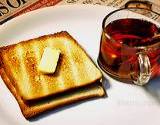 | 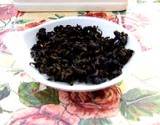 | 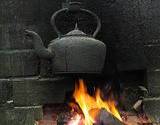 |
Black tea is rarely thought of as a medicinal tea. Once you know the secret to brewing this popular type of tea you'll find that even the caffeine is medicinal. Of the three main varieties of tea, black, green and oolong, black is by far the most common and popular. This tea, as with any medicinal tea is best when you buy it as fresh loose tea.
Included in the black tea, or Camellia sinensis, family are orange pekoe, Darjeeling and the breakfast teas. Though all teas come from the same plant, each variety is processed differently. The tea plant is actually a tree and grows only in certain climates. The world's major tea-growing areas are in the higher elevations (up to 6,500 feet) of China, Japan, India, Sri Lanka and East Africa.
After the evergreen shoots of this tea are picked, they are withered, rolled, fermented and dried. An important ingredient in black tea is caffeine. Unlike the high levels of caffeine found in coffee, however, the lower amounts of this tea promote blood flow in the brain without over stimulating the heart.
Black tea also contains abundant tannins, astringent chemicals found in many herbs that have soothing anti-inflammatory effects on the digestive tract.
The Brewing is the Secret to Making this Medicinal
To brew the tea, use 1 rounded teaspoon of black tea per 1 cup of hot water. A muslin pouch works well for this purpose. Let the tea step for 4-8 minutes. This allows enough tea to release most of the soothing tannins. If you steep the tea for a shorter period, only 2 ½ minutes, or so, it will contain mainly the stimulant caffeine. Add some lemon juice to the tea for an effective cold remedy.
Black tea taste best when brewed with soft water. True connoisseurs use non-sparkling mineral water. Very hard tap water should be boiled for at least 30 seconds before brewing to reduce any unpleasant taste.
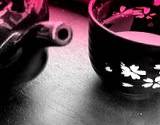 | 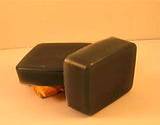 | 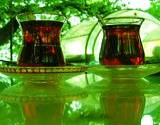 |
The Medicinal Benefits of
Black Tea
The medicinal action of black tea is due primarily to its tannins, which exert a soothing effect on the mind and body. The caffeine in this tea sharpens mental focus and concentration, and the trace element, fluoride inhibits tooth decay. Read Grandma's Cavity Prevention Guide .
Theophylline & Heart Benefits
Black tea also contains very small amounts of theophlline, a gentle stimulant that can benefit the heart and central nervous system. Theophylline increases blood flow in the capillaries and helps the body maintain normal blood pressure. It can also expand the airways, making breathing easier for asthmatics.
Theanine & Brain Activity
Theanine is also found in black tea. It is closely related to the amino acid glutamate, which provides fuel for the brain and stimulates brain activity. Theanine also reduces the stimulant actions of caffeine, thereby helping to prevent such a side effects as nervousness.
Medicinal Tea Recipes &
Rum Tea Punch
Peppermint Iced Tea
- 3 teaspoons black tea
- 3 teaspoons peppermint tea
- Juice of 1 lemon
- Sugar
- Ice cubes
Pour 1 quart of boiling water over the teas. Steep for 4-8 minutes and strain. Add lemon juice and sugar to taste. Pour the hot tea over ice cubes for a refreshing summer thirst quencher.
Popular Fitness Tea
- 4 teaspoons black tea
- Juice of 1 lemon
- Sugar
- Ice cubes
Pour 1 quart of boiling water over the tea. Steep for 4-8 minutes and strain. Add lemon juice and sugar to taste. Enjoy this fitness tea hot or pour it over ice cubes. It's an invigorating pick-me-up.
Rum Tea Punch
- 4 teaspoons black tea
- 1 cup dark rum
- Sugar
Pour 1 quart of boiling water over tea. Steep for 4-8 minutes and strain. Add the rum and heat gently. Add sugar to taste. Enhance the flavor by adding orange juice, cinnamon or cloves along with the rum. This tea will warm you up on cold winter days.
Relieves Diarrhea
Black tea has a therapeutic effect on gastric and intestinal illnesses because of its tannins, which decrease intestinal activity and exert an anti-diarrheal effect. To get the maximum benefit for the treatment of diarrhea, let the tea steep for a full 15 minutes. This will release a good amount of tannins. In addition, drink the tea unsweetened.
Sharpen Concentration
A person's intellectual performance normally peaks between 9:30 and 11:30 A.M. and declines at about 1:00 P.M. The mental performance of someone who drinks 3 cups of black tea a day, early in the morning, just before noon and in the afternoon, is 50 percent higher than that of someone who doesn't drink the tea.
Tooth Decay
Fluoride, a trace element found in black tea, strengthens tooth enamel, thereby helping to prevent tooth decay. Most people get enough fluoride through regular dental visits, but you can supplement your fluoride intake by drinking this tea.
Lowers Cholesterol Levels
In addition to improving circulation, the theophylline in black tea may improve cholesterol levels. To reduce LDL ("bad") cholesterol levels, drink 2 cups of tea every day for 3 weeks.
DISCLAIMER:
The statement's made here have not been approved by the Food and Drug Administration. These statements are not intended to diagnose, treat or cure or prevent any disease. This notice is required by the Federal Food, Drug and Cosmetic Act.
Return from Black Tea Medicinal Secret to Grandma's Medicinal Teas Recipes Guide
Return to Grandma's Wisdom Home





